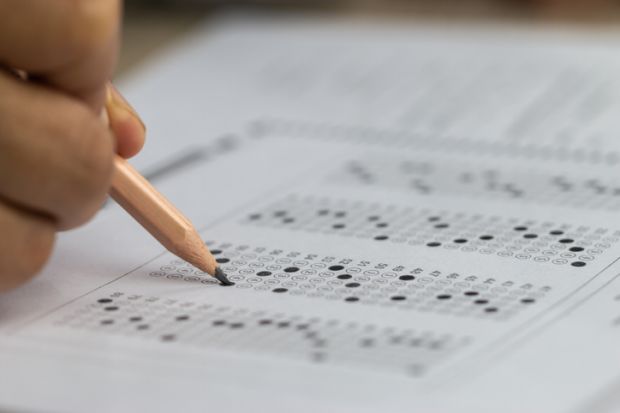A recent case of cheating by students taking Pakistan’s Medical and Dental College Admission Test (MDCAT) serves as a cautionary tale about the dual nature of technology.
Medical admission tests in Pakistan are traditionally well known for their transparency and meritorious selection of the few thousand students, among hundreds of thousands of applicants, to be permitted entry to the nation’s prestigious medical colleges.
However, that reputation has been tarnished in the Khyber Pakhtunkhwa (KPK) province, which includes cities such as Peshawar and Mardan, where reports have drawn attention to the alarming use of covert Bluetooth devices by dozens of the 45,000 students taking the MDCAT on one day in September. These devices, which apparently incorporate miniature earpieces to receive answers and assistance during the exams, were reportedly sold by unknown actors for a hefty sum of approximately $10,000 (£8,300), with the promise of enabling the students to achieve scores exceeding 90 per cent.
Sure enough, the number of students receiving that score leapt by 580 per cent this year. No other score range saw a change of more than 25 per cent either way. And this in a year in which the overall pass rate (those scoring 45 per cent or more) declined by nearly five percentage points to 63.5 per cent, implying a likely increase in the rigour of the test. The remarkable surge in students scoring above 90 per cent defies the expectations of a normal distribution and statistical probabilities, strongly suggesting that cheating has occurred.
The province’s secretary of higher education and the chief secretary quickly took note of the situation and some of the cheating students were arrested. More recently, the caretaker cabinet of the province decided to reconduct the 2023 MDCAT due to alleged irregularities and established a joint investigation team to further investigate the issue. This prompted the Peshawar High Court to put a temporary halt on the announcement of the results of the MDCAT after a case was lodged challenging the alleged cheating. The court later closed the case, citing the caretaker cabinet’s decision to conduct a new test with transparency.
The Educational Testing and Evaluation Agency (ETEA), the agency responsible for conducting exams, previously issued an announcement stating that, in light of the “feedback”, it was conducting a “post-test analysis”.
Yet such statements and declarations amount to little more than wishful thinking if concrete anti-cheating measures are not implemented. It is imperative that educational institutions, policymakers and the public in KPK at large recognise and promptly address this issue. First and foremost, those who plotted and participated in this cheating must be brought to justice. Officials of ETEA who were involved should also be held accountable.
This incident also highlights the urgent need for alternative ways of handling the exams. Technological solutions could be deployed to minimise the instances of cheating. For example, tests could be conducted on computer, as they were during the previous government’s tenure in 2021. However, handling assessments this way would require large question banks and the use of randomisation algorithms to generate unique exams for each test-taker, further reducing the likelihood of sharing answers.
Second, institutions must invest in advanced detection systems capable of identifying and preventing unauthorised devices during exams, such as security cameras and wi-fi jammers.
Importantly, instead of relying solely on ETEA to administer exams, the provincial government should consider investing in its own test centres. These could accommodate thousands of applicants on the same day for various exams, not limited to medical but also including engineering exams. By charging a subsidised fee, the revenue generated would help these government centres to become self-sustaining.
But, and perhaps most importantly, educators at all levels must try harder to foster a culture of academic integrity, emphasising the consequences of cheating. As every doctor knows, prevention is better than cure, and that applies to cheating in medical exams as much as it does to other human afflictions.
Muhammad Salar Khan holds a PhD in public policy and has received training through the Don E. Kash Postdoctoral Fellowship in Science and Technology Policy, both at the Schar School of Policy and Government at George Mason University. Shandana Kifayat and Shanlina Kifayat are trainee medical officers and fellows of the College of Physicians and Surgeons at Khyber Teaching Hospital and Lady Reading Hospital respectively, both in Peshawar. Muhammad Ali Jan Khan is a recent Faculty of Science pre-medical graduate from Islamia College Peshawar.
Register to continue
Why register?
- Registration is free and only takes a moment
- Once registered, you can read 3 articles a month
- Sign up for our newsletter
Subscribe
Or subscribe for unlimited access to:
- Unlimited access to news, views, insights & reviews
- Digital editions
- Digital access to THE’s university and college rankings analysis
Already registered or a current subscriber? Login








